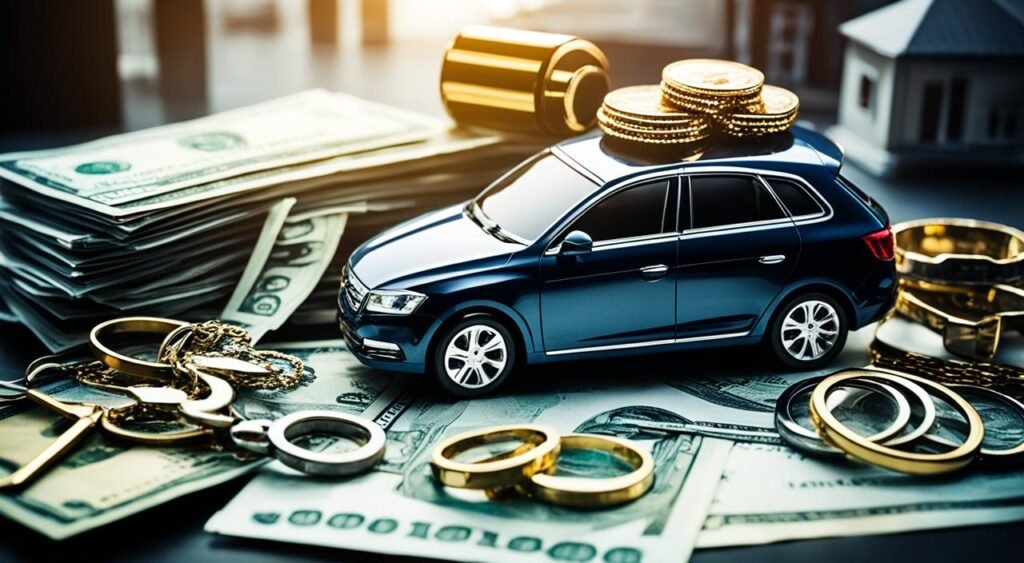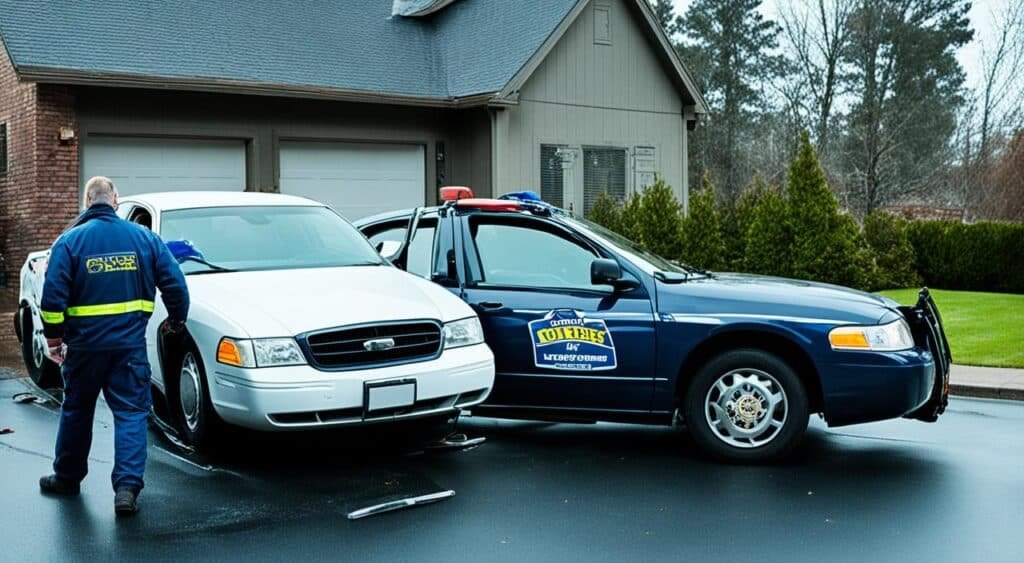Secured personal loans can be a good choice when you need to borrow money. They often have lower interest rates than unsecured loans. Plus, you might be able to borrow more money. But there are important things to think about before saying yes.
One big plus of these loans is that you give the lender something valuable as security. This could be your car, house, or a savings account. This makes the lender more comfortable and they may give you better loan terms. However, if you can’t pay back the loan, you may lose whatever you put up as security.
It’s very important to think carefully before getting a secured loan. Look at the good and the bad side. Think about what you can risk and what you can afford. Your credit score, how much money you make, and your other debts are really important. So is the asset you’re willing to give as security.
Also, consider what happens if you can’t pay back the loan. It could hurt your credit score. So, be sure to understand all this before taking the loan.
Key Takeaways
- Secured personal loans require collateral, such as a car or home, which can lower interest rates but poses the risk of losing the asset if you default.
- Lenders may offer larger loan amounts and more flexible repayment terms with secured loans compared to unsecured loans.
- Carefully consider your financial situation, credit profile, and risk tolerance before taking out a secured personal loan.
- Explore alternative options, such as unsecured personal loans or home equity products, to determine the best fit for your needs.
- Understand the potential consequences of defaulting on a secured personal loan, including the impact on your credit score and asset repossession.
Understanding Secured Personal Loans
When people look at loan options, they might find secured personal loans. These are different from unsecured loans in a few ways. They come with both good points and risks for the person taking the loan. To understand secured personal loans, we should look at what they are, how they work, and their differences from unsecured loans.
What is a Secured Personal Loan?
A secured personal loan needs the borrower to offer an asset as collateral. This asset could be a car, home, or savings account. The collateral makes the lender feel safer. If the borrower can’t pay back the loan, the lender can take the asset and sell it to get their money back.
How Secured Personal Loans Work
Lenders protect themselves by using the borrower’s collateral. They check how much the asset is worth, which affects the loan amount and interest rate. If you don’t have the best credit scores, a secured loan might be easier to get because the asset lowers the risk for the lender.
Secured vs. Unsecured Personal Loans
Secured and unsecured personal loans differ in the need for collateral. Unsecured loans are without collateral but have higher interest rates and lower loan amounts. Secured loans have lower interest rates and can offer larger loan amounts, but the asset is at risk if you can’t pay back the loan.
| Feature | Secured Personal Loan | Unsecured Personal Loan |
|---|---|---|
| Collateral Required | Yes | No |
| Interest Rates | Lower | Higher |
| Loan Amounts | Larger | Smaller |
| Qualification Criteria | More accessible for borrowers with lower credit scores or limited credit history | May be more difficult for borrowers with lower credit scores or limited credit history |
| Risk to Borrower | Potential loss of collateral asset if unable to repay the loan | No risk of losing an asset, but higher interest rates |
Advantages of Secured Personal Loans

Secured personal loans offer lower interest rates than unsecured loans. This is because they use collateral. The collateral lowers the risk for lenders. As a result, they can offer better rates. This benefit is great for those looking to cut costs over time.
Larger Loan Amounts
With secured personal loans, you can get larger loan amounts. This is possible because lenders feel more secure with the collateral. Things like vehicles or real estate can be used as assets. This is perfect for big purchases or debt consolidation needs.
Easier to Qualify
Secured loans are easier to qualify for if you have a lower credit score. This is because the collateral helps the lender feel more comfortable. It becomes an option for people trying to improve their credit or overcome past financial struggles.
Risks of Secured Personal Loans

Secured personal loans have many benefits. But it’s key to know the risks too. The big worry is losing the thing you put up for the loan if you can’t pay back.
If you don’t repay, the lender can take and sell what you used as security. This means you could lose your car, house, or other big items. So, thinking about the risk of losing these things is really important before getting the loan.
Potential Loss of Collateral
The biggest risk of a secured personal loan is losing what you put up. If you can’t pay, the lender might sell your item. This is hard for people who used important things like their house or car as security.
Asset Value Requirements
Secured loans also come with the risk of the lender valuing your item too low. They check the value to see how much they’ll lend you. If they think your item is worth less, you might not get the full loan amount. This could limit what you can do with the loan.
Types of Secured Personal Loans
Secured personal loans come in various forms with different types of assets used as security. These assets can be things like savings accounts, certificates of deposit, or cars.
Savings-Secured Loans
A savings-secured loan lets you use your savings account as a guarantee. It’s good for those with less credit or income. The bank puts a hold on your account. If you don’t pay back the loan, they may take the money from there.
Certificate of Deposit (CD) Secured Loans
A CD-secured loan is when you borrow against your certificate of deposit. The bank keeps the CD until you pay back the loan. It can help if you need a loan but have money locked in a CD.
Auto Title Loans
In auto title loans, your vehicle is the collateral. The lender takes ownership of your car’s title. They can sell the car if you don’t pay. It’s an option for those needing quick funds, like people with bad credit or pressing financial situations.
Though each loan type uses different collateral, they offer bigger loans with lower interest rates. The downside is the risk of losing your asset if you can’t repay the loan.
Secured Personal Loan
A secured personal loan asks the borrower to offer something valuable, like a car or house, as a promise to pay. This keeps the lender safe if the borrower can’t pay back. People usually get secured personal loans at a lower interest rate and for more money than with unsecured personal loans. But, they might lose their car or home if they don’t pay back.
If you need more money or a lower interest rate and have bad or no credit, a secured personal loan could be a good choice. Just remember there’s a risk, and you could lose your collateral if you can’t repay the loan.
Common Collateral for Secured Loans

Secured loans mean borrowers give assets to back up the money they borrow. Common forms of assets used are vehicles, real estate, and money from investment or savings accounts.
Vehicles
Cars, trucks, and motorcycles are often used as collateral, especially for auto loans. If the borrower doesn’t pay back the loan, the lender can take the vehicle. This protects the lender’s money.
Real Estate
Properties like homes or investments can be used too. For mortgages or lines of credit, the home equity is the security. This lessens the lender’s risk and could mean better loan terms.
Investments and Savings Accounts
Investment or savings accounts can also be collateral. They’re used for loans that need cash security. If the loan isn’t paid, the lender can use this account to make up for their loss.
Qualifying for a Secured Personal Loan
Lenders check your credit score, income, and how much you owe. Most need a credit score of about 600. This can change, so check with the lender.
Credit Score Requirements
Your credit score shows how well you handle money. A good score helps you get better interest rates. If your score is low but you can put up something as security, you might still get a loan.
Income Requirements
Lenders want to make sure you earn enough to pay back the loan. They might ask for paystubs or tax papers. If you have a regular job, it’s easier to get a loan.
Debt-to-Income Ratio
Your debt-to-income ratio shows how much of your pay goes to debts. Having less debt is better. It shows you can more easily pay back the loan.
Getting a secured personal loan looks at how good you are with money and if you can pay back. If you meet the credit score, income, and debt-to-income ratio marks, you’re more likely to get the loan you want. This is true if you need a lot of money or want to pay less interest.
Applying for a Secured Personal Loan
Getting a secured personal loan is a detailed process. You need to show proof of who you are, where you work, and what you make. Also, you have to provide info about the thing you’re putting up as security. If it’s a car or house, you must show the correct papers.
Documentation Required
To apply, you have to give these documents:
- Proof of identity (driver’s license, passport, etc.)
- Proof of income (pay stubs, tax returns, W-2 forms, etc.)
- Information about the collateral asset (vehicle registration, property deed, etc.)
- Proof of ownership or possession of the collateral asset
- Details on the current market value and condition of the collateral
Comparing Lenders and Rates
It’s vital to look at different lenders when applying for this loan type. You aim to find low interest rates and terms that meet your needs. Considerations include the annual percentage rates, how much you can borrow, and when it should be paid back. Also, check for extra fees or things you must do for the secured personal loans of 2024, auto loans, or savings-secured loans. By doing this, you’ll pick the deal that’s best for your wallet.
What Happens If You Default?

If you don’t pay a secured personal loan, the lender can take the collateral. This is like taking your car or house if they were used as collateral. Then, the lender can sell this to make up for the loan you didn’t pay. It’s a tough situation for the borrower because not only do they lose their valuable item, but it also affects their credit score. This repo action is reported to the credit bureaus and stays on your report for up to seven years.
Repossession of Collateral
Not paying a secured personal loan allows the lender to take your collateral and sell it. This adds to the stress because the borrower might lose their car or house. This repossession stays on your credit report, which means getting loans or good interest rates could be harder.
Impact on Credit Score
Defaulting on a loan and losing the collateral can really hurt your credit score. The negative impact remains on your credit report for seven years. This makes getting future loans, whether it’s bad credit loans or normal loans, very hard. It can affect your finances for a long time.
Alternatives to Secured Personal Loans
Secured personal loans have their benefits, but they’re not right for everyone. Unsecured personal loans are another choice. They don’t need you to put up any collateral but might charge higher interest rates.
Credit cards offer quick funds without needing collateral. Yet, their interest rates are often higher than secured loans. If you don’t have assets to risk, this could be a good option.
Unsecured Personal Loans
If you prefer not to risk an asset, check out Best Egg or a local credit union. They offer unsecured personal loans based on your credit history. While the interest rates might be a bit higher, you won’t lose your possessions if you can’t pay.
Credit Cards
Using a credit card for your needs is another route. It offers quick funding without collateral. But be aware, the interest rates could be higher than other loan options. It’s great for flexibility or if you lack assets for a secured loan.
Home Equity Loans or Lines of Credit
If you own a home, home equity loans or lines of credit could be ideal. It lets you borrow against your home’s value. This method often offers lower rates for a bigger sum than unsecured loans.
Also Read: How Jumbo Mortgage Loans Redefine Homeownership
Conclusion
Secured personal loans offer a way to borrow more or at lower rates. But, you could risk losing your asset used as collateral. Think about the good and bad points before you decide to get a secured personal loan. Make sure you know what it takes to qualify. Look at other options that might be a better fit for your money needs and goals.
Think about your credit score and how much you make. Also, consider how much debt you already have. This will help you see if a secured personal loan is a good idea. Know what you can use as collateral. This might be vehicles, real estate, or even your savings. This will help you choose the right kind of loan.
It’s really important to think carefully before choosing a secured personal loan. Make sure it meets your financial needs and you’re okay with the risks. Consider what might happen to your credit if you can’t pay back the loan. There are other ways to borrow money. Look into unsecured personal loans, credit cards, or home equity loans. Find the best option for reaching your financial goals in the long run.
FAQs
Q: What is a secured personal loan and what should I consider before taking one out?
A: A secured personal loan requires collateral, such as a vehicle or savings account, to secure the loan. Before taking one out, consider the interest rate, repayment terms, and the risk of losing your collateral if you default on the loan.
Q: How can I get a secured personal loan with bad credit?
A: If you have bad credit, you may still be able to get a secured personal loan by offering valuable collateral or applying with a co-signer who has good credit.
Q: What are the best secured personal loans of 2024?
A: The best secured personal loans of 2024 offer competitive interest rates, flexible repayment terms, and fast approval processes. Consider researching different lenders to find the best option for your financial needs.
Q: Do secured personal loans require collateral?
A: Yes, secured personal loans require collateral to secure the loan. Collateral can include assets such as a home, car, savings account, or other valuable property.
Q: What type of collateral is typically accepted for a secured personal loan?
A: Lenders may accept various types of collateral for a secured personal loan, including vehicles, real estate, cash savings, or valuable assets such as jewelry or art.
Q: Can I get a secured personal loan from a federal credit union?
A: Yes, federal credit unions often offer secured personal loans to their members. Consider joining a credit union to access competitive interest rates and personalized service.
Q: What should I know about interest rates when considering a secured personal loan?
A: Interest rates on secured personal loans can vary depending on the lender, your credit score, and the amount of collateral you offer. Compare rates from different lenders to find the most competitive option.
Source Links
- https://www.forbes.com/advisor/personal-loans/personal-loan-requirements/
- https://www.bankrate.com/loans/personal-loans/what-is-a-secured-loan/

